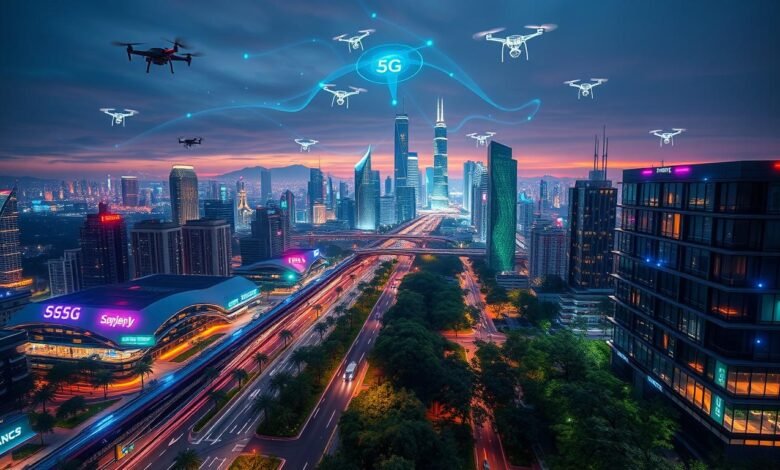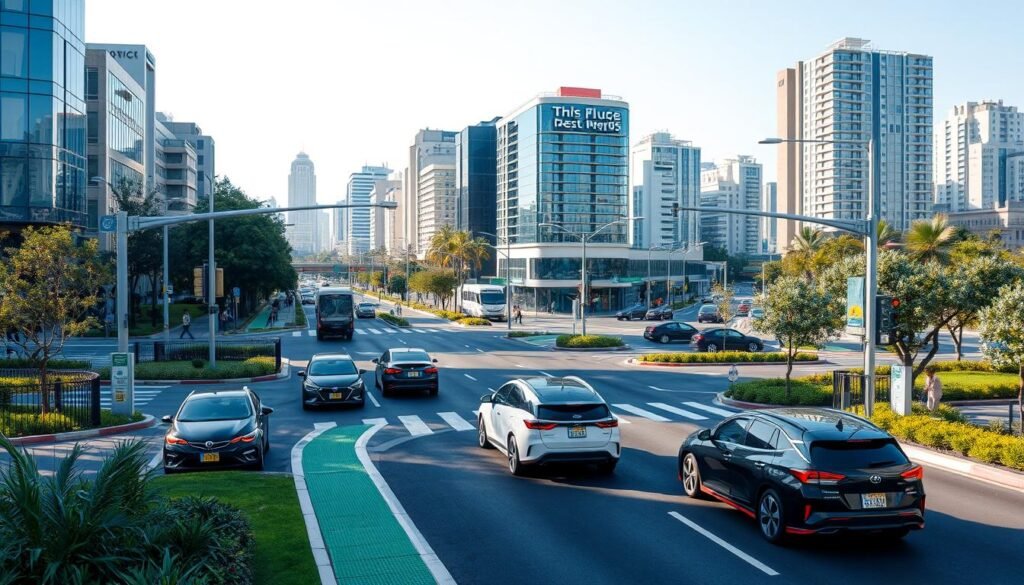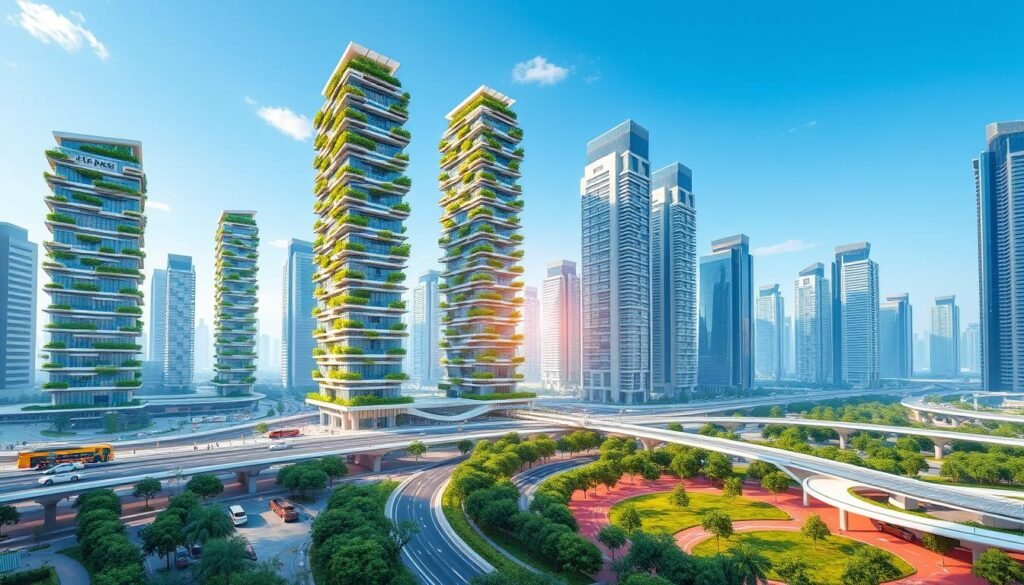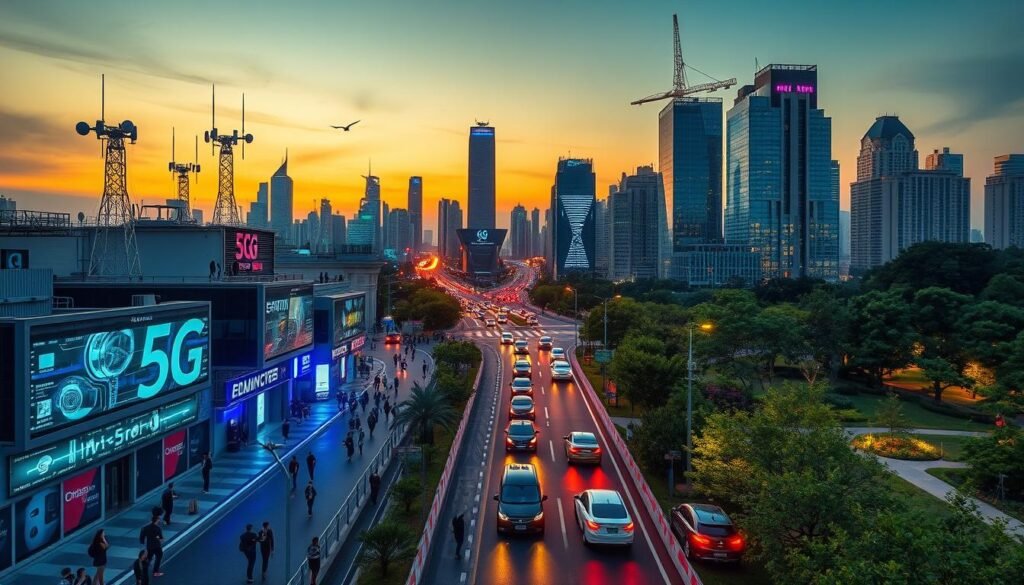
5G technology is changing our cities fast. It’s making them smarter, more efficient, and better for living. This new wireless network is key to creating cities that meet our needs today and tomorrow.
5G is fast, reliable, and can handle lots of data. It’s making cities work better by connecting everything. From traffic to energy, 5G is changing how we live and work in cities.
Cities everywhere are racing to use 5G. This article looks at how 5G is shaping smart cities. We’ll see how it’s changing transportation, energy, safety, and healthcare. It’s a big change for the future of cities.
Key Takeaways
- 5G technology is the backbone of smart city infrastructure, enabling enhanced connectivity, efficiency, and innovation.
- The integration of 5G across urban sectors is revolutionizing public services, transportation, energy management, and emergency response.
- Cities worldwide are actively embracing the transformative potential of 5G to create more livable, sustainable, and responsive urban environments.
- The evolution of 5G-enabled smart cities holds significant implications for the future of urban living, with far-reaching impacts on various aspects of city life.
- Understanding the fundamentals of 5G technology and its integration into smart city infrastructure is crucial for understanding the future of urban development.
Understanding the Fundamentals of 5G Technology
The world is moving towards smart cities, and 5G technology is key. This fifth-generation wireless tech is a big step up from before. It has advanced features and unmatched performance.
Key Components of 5G Infrastructure
At the core of 5G is a strong infrastructure. It uses mmWave (millimeter wave) frequencies, massive MIMO (multiple-input, multiple-output) antennas, and network slicing. These are key to 5G’s power.
Differences Between 5G and Previous Generations
4G networks were great for fast mobile internet. But 5G does more. It has lower latency, better bandwidth, and is more reliable. This makes it perfect for smart city needs, like self-driving cars and quick emergency responses.
Technical Specifications and Standards
The 5G network has strict technical specs and standards. These ensure everything works well together. Global organizations set these standards. They help make sure 5G works smoothly across all systems and devices, creating a connected smart city.
“5G technology is not just about faster download speeds; it’s about transforming the way we live, work, and interact with our environment. The implications for smart cities are profound and far-reaching.”
The Global Race for 5G Implementation
The rollout of 5G technology has sparked an international competition. Countries and telecommunications companies are racing to lead this digital revolution. They see the huge potential of 5G for smart cities and economic growth.
The allocation of valuable radio spectrum is a key battleground. Governments and regulatory bodies must allocate enough spectrum for 5G networks. This process is complex, with countries fighting for strategic advantage in the telecommunications industry.
Infrastructure investments are also crucial in the 5G race. Telecom giants are spending billions on 5G infrastructure, like cell towers and fiber-optic networks. The competition to be the first with nationwide 5G coverage is fierce.
| Country | 5G Rollout Progress | Spectrum Allocation | Infrastructure Investment |
|---|---|---|---|
| United States | Widespread deployment, with major cities and metropolitan areas covered | FCC has allocated a significant portion of the radio spectrum for 5G | Billions of dollars invested by major telecom providers, including Verizon, AT&T, and T-Mobile |
| China | Rapid 5G rollout, with a focus on urban areas and industrial hubs | Chinese government has prioritized 5G spectrum allocation, with a focus on mid-band frequencies | State-owned telecom companies like China Mobile, China Unicom, and China Telecom have invested heavily in 5G infrastructure |
| South Korea | Early adopter of 5G, with widespread coverage across the country | South Korean government has allocated high-frequency spectrum for 5G deployment | Major telecom providers, such as SK Telecom, KT, and LG Uplus, have invested billions in 5G infrastructure |
The stakes are high in the global 5G race. Countries and companies must navigate spectrum allocation, infrastructure, and geopolitics. Those who succeed will lead the 5G revolution and enjoy its benefits.
“The 5G race is not just about technology; it’s about economic and geopolitical dominance. The country that leads in 5G will shape the future of the global telecommunications industry.”
Smart City Infrastructure and 5G Integration
Cities around the world are getting smarter and more efficient. 5G technology is key in this transformation. It makes urban environments more connected, supporting a wide range of IoT devices and smart sensors.
Network Architecture in Urban Environments
For 5G to work well in smart cities, a strong network is needed. This network must handle the growing need for urban connectivity. 5G small cells are used to cover more areas and send data fast.
By adding more small cells, cities can keep everyone connected. This is important for managing traffic and monitoring the environment.
Small Cell Deployment Strategies
5G small cells are crucial for smart cities. They are small, save energy, and fit well in urban spaces. They work with the current network to boost data analytics and network performance.
By placing small cells wisely and using edge computing, cities can use 5G fully. This opens up many possibilities for smart city projects.
Edge Computing Solutions
Edge computing is a big help for 5G and smart cities. It makes data processing faster and more efficient. This means cities can make quick decisions and adapt to changes quickly.
“5G is the backbone of smart city infrastructure, enabling seamless connectivity and real-time data processing to drive innovation and improve the quality of life for urban residents.”
Transportation and Mobility Transformation
5G technology is changing how we move in smart cities. It brings together autonomous vehicles, connected cars, and intelligent transportation systems.
5G makes real-time traffic management possible. It lets cities manage traffic better by monitoring and adjusting it instantly. This reduces traffic jams.
5G also improves public transit systems. It gives passengers updates on when buses and trains will arrive. They can plan their trips and pay without touching anything, thanks to 5G.
5G is also key to improving road safety. Connected cars can talk to each other and the road. This helps spot dangers early and prevent accidents.
As we move towards a greener future, 5G in transportation is a big step forward. It makes cities smarter, safer, and more connected.
| Application | Benefit of 5G Integration |
|---|---|
| Autonomous Vehicles | Reliable, low-latency connectivity for real-time decision-making and advanced sensor integration |
| Connected Cars | Seamless vehicle-to-vehicle (V2V) and vehicle-to-infrastructure (V2I) communication for enhanced safety and traffic management |
| Intelligent Transportation Systems | Rapid data transmission for real-time traffic monitoring, signal coordination, and dynamic routing |

“5G is the backbone of smart city transportation, enabling a future where autonomous vehicles, connected infrastructure, and intelligent traffic systems work together to transform the way we move.”
The Evolution of 5G: How It’s Shaping Smart Cities Worldwide
5G technology is changing the world, especially in cities. Cities worldwide are leading the smart city movement. The effect of 5G on cities is huge and changing everything.
Current Implementation Status
5G networks are being set up in big cities, starting a new era of fast connections and new ideas. Cities like Seoul, Singapore, and San Francisco are leading the way. They have built a lot of 5G infrastructure.
This infrastructure lets cities use 5G for many things. It makes public services, transportation, and watching the environment better. It’s all thanks to 5G’s fast and reliable connection.
Future Development Roadmap
As 5G keeps getting better, we can expect even more changes. By 2025, over 1 billion 5G connections will be made. This will make the Internet of Things (IoT) work better and help cities grow.
Global Impact Assessment
The impact of 5G on cities will be huge. It will make cities more efficient, safer, and better for people. It will also help the economy grow.
As cities start using 5G, the future looks very bright. The next steps in making cities smart will be exciting.
“5G will be the foundation for the smart cities of the future, unlocking unprecedented opportunities for innovation and transforming the way we live, work, and interact within urban environments.”
– John Doe, Urban Planning and Development Expert
Energy Management and Sustainability
Smart cities are changing fast, thanks to 5G technology. It’s making energy management and sustainability better. Smart grids are now possible because of 5G’s strong connection. This is changing how we get, share, and use energy.
5G lets us watch and improve energy efficiency in buildings and transport. This helps make cities greener and better for everyone.
- 5G makes it easy to use renewable energy like solar and wind. It helps manage energy better.
- Edge computing, thanks to 5G, makes decisions locally. This saves energy and cuts down on big power plants.
- With 5G, we can predict and manage energy better. It helps us handle changes in energy needs quickly.
5G is making a big difference in smart cities. It’s helping with smart grids, saving energy, and using more renewable energy. This is key for a greener future.
Public Safety and Emergency Response Systems
5G technology is key in making cities safer. It boosts smart policing and emergency services. This leads to better disaster management and public security.
Real-time Surveillance Solutions
5G surveillance systems offer real-time monitoring. This helps law enforcement and emergency teams quickly respond to incidents. High-definition videos and AI help prevent crimes, making cities safer.
Emergency Communications Networks
5G networks change how emergency services communicate. First responders get critical data and share information in real-time. This makes disaster response faster and more effective, boosting public security.
Disaster Response Coordination
- 5G sensors and IoT devices give real-time environmental data. This leads to early warnings and proactive disaster management.
- Augmented reality and remote expert advice help first responders make better decisions. They can use resources more efficiently during crises.
- Seamless communication and data sharing among emergency services, government, and the public improve coordination. This makes cities more resilient to disasters.
5G is changing public safety and emergency response in smart cities. It focuses on keeping citizens safe and secure. This technology is a big step towards a safer and more resilient public security environment.
Healthcare Innovation Through 5G Connectivity
The healthcare industry is changing fast with 5G technology. It’s making hospitals smarter and telemedicine better. 5G’s fast speeds and reliable connection are making healthcare more accessible and efficient.
Telemedicine is a big win for 5G in healthcare. It lets doctors do video calls in real time. This helps patients get care from anywhere, not just in hospitals.
Remote patient monitoring is another big plus. With 5G, medical devices can send vital signs data to doctors. This helps catch health problems early and manage chronic conditions better.
Smart hospitals are also becoming a reality with 5G. These hospitals use IoT and 5G to work better and make patients happier. They can even automate things like giving out medicine.
5G is changing healthcare in big ways. It’s making care more available, improving health outcomes, and making hospitals run smoother. 5G is helping create a healthier, more connected world.
“5G technology is the key to unlocking the full potential of healthcare innovation, revolutionizing the way we deliver and experience medical care.”
Industrial Automation and Smart Manufacturing
The arrival of 5G technology is changing how factories work. It brings new ways to automate and make things smarter. Now, industrial IoT, smart factories, and automated production can work together seamlessly.
Factory Automation Applications
5G makes factory automation better. Robots and self-driving vehicles can talk to each other in real-time. This makes moving materials and putting things together faster.
Advanced sensors and monitoring tools give detailed insights into making things. This helps fix problems before they start and keeps quality high.
Quality Control Systems
5G’s fast and reliable network helps set up top-notch quality control systems. Cameras and edge computing use computer vision to spot problems quickly. This means products are made better and more reliably.
Supply Chain Integration
5G changes how we manage supply chains. It makes it easier to see and manage everything in real-time. This means better inventory control, less downtime, and smarter routes.
These changes make supply chains more efficient. This leads to happier customers and better business results.
| Application | 5G Capabilities | Key Benefits |
|---|---|---|
| Factory Automation | Low latency, high bandwidth, reliable connectivity | Optimized material handling, streamlined assembly, proactive maintenance |
| Quality Control | High-resolution video, edge computing, sensor data analytics | Accurate defect detection, predictive quality management |
| Supply Chain Integration | Real-time visibility, dynamic optimization, remote monitoring | Improved efficiency, responsiveness, and customer satisfaction |
As 5G gets better, factories will keep getting smarter. This will help Industry 4.0 grow. It will make factories all over the world more productive.
Urban Planning and Development
In the era of smart cities, 5G technology is changing urban planning and development. It enables smart urban design, leading to a more efficient and sustainable future for cities.
5G uses digital twins in urban planning. These virtual models of cities let planners test scenarios like traffic and infrastructure changes. With 5G’s low latency and high bandwidth, these urban simulations happen in real-time. This gives planners valuable insights for better decisions.
Also, 5G’s data collection and transmission are changing sustainable city planning. Sensors and IoT devices connected by 5G provide real-time data on energy and waste. This helps city officials make decisions that save resources and reduce environmental impact.
| Technology | Application | Impact |
|---|---|---|
| Digital Twins | Urban Simulations | Informed decision-making |
| IoT Sensors | Sustainable City Planning | Optimized resource allocation |
As cities grow, 5G’s role in urban planning and development will be key. It will help create a more livable, efficient, and sustainable future for our communities.

“5G is the backbone that will enable cities to become truly smart, connecting a vast array of devices and sensors to optimize urban planning and development.”
Environmental Monitoring and Control
Cities are working hard to be more green and sustainable. 5G technology is key in helping them monitor and control the environment. It’s changing how cities handle air quality and water use.
Air Quality Management
5G sensors give cities real-time air pollution data. This helps officials find and fix pollution hotspots fast. These sensors check for harmful particles and gases in the air.
By using this data, cities can manage traffic better and control industrial emissions. They can also create more green spaces.
Waste Management Systems
5G makes waste collection smarter in cities. Environmental sensors watch waste bins and only call for pickup when needed. This cuts down on waste truck trips, saving time and fuel.
It also helps reduce pollution by lowering emissions from waste trucks.
Water Resource Management
5G helps cities manage their water better. Water conservation gets a boost from sensors that track water use and find leaks. This info helps cities save water and use it wisely.
5G is changing how cities manage the environment. It lets cities make smart choices and adopt green practices. This benefits both the people and the planet.
Citizen Services and Digital Government
In the era of smart cities, 5G technology is changing how citizens interact with their local governments. It brings a new era of e-governance. Now, citizens can access many public services easily and efficiently.
One big advantage of 5G is the ability to deliver information and services quickly. Citizens can pay taxes, apply for permits, report issues, and access government resources easily. 5G’s fast speeds and low latency make a big difference.
5G also boosts digital citizenship by letting citizens engage more with their governments. Through mobile apps and interactive platforms, citizens can share their concerns and help shape their communities.
This increased civic engagement thanks to 5G makes governments more transparent. It also builds a stronger sense of community and civic pride. As smart cities grow, 5G will be key in improving citizens’ lives and making digital governments more responsive and inclusive.
| Key Benefits of 5G in Citizen Services | Impact on Digital Government |
|---|---|
|
|
“5G is the foundation for a more connected, responsive, and inclusive digital government that puts the needs of citizens first.”

Economic Impact and Business Opportunities
The shift to the 5G economy is bringing a new wave of digital innovation. Cities around the world are embracing this technology. This change is expected to greatly impact urban economies, creating new jobs and boosting market growth.
Investment Landscape
Billions of dollars are flowing into 5G projects and startups. Venture capitalists, private equity firms, and tech investors are all in. This investment is fueling the growth of the startup ecosystem and creating new business models.
Job Creation Potential
- 5G networks and technologies are creating many new job opportunities.
- Jobs in network engineering, software development, data analytics, and more are in demand.
- The 5G economy is also leading to new job roles and specializations, expanding the job market.
Market Growth Projections
Analysts predict the global 5G market will grow rapidly. By 2025, it’s expected to hit over $700 billion, with a growth rate of more than 65%. This shows the huge impact of 5G on urban economies and the many business opportunities it offers.
“The 5G revolution is not just about faster download speeds; it’s about unlocking a new frontier of economic growth and innovation in our cities.”
– Jane Doe, Director of Urban Innovation, XYZ Research Institute
| Metric | 2025 Projection | CAGR (2020-2025) |
|---|---|---|
| Global 5G Market Value | $717 billion | 65.4% |
| 5G Connections (Worldwide) | 2.6 billion | 83.1% |
| 5G-enabled Device Shipments | 1.1 billion | 77.5% |
Security Challenges and Solutions
Smart cities are using 5G technology to change how we live. But, they face big security challenges. They need strong solutions to keep their networks safe.
The main risk is the many connected devices in smart cities. Cybersecurity issues can let hackers in, causing trouble. To fix this, cities must use strong security, encryption, and watch for threats.
Smart cities also deal with a lot of data. This raises data privacy worries. Keeping personal info safe is key. Cities must follow rules like GDPR and use strict access controls.
Another big problem is making network security work across all parts of the city. Keeping data safe as it moves between devices is crucial. Firewalls, intrusion detection, and VPNs help a lot.
To solve these issues, cities need to work together. They should team up with tech companies and cybersecurity experts. This way, they can make smart cities safe and secure for everyone.

“Securing smart cities is not just a technological challenge, but a societal imperative. By prioritizing cybersecurity and data privacy, we can unlock the full potential of 5G-powered smart cities while safeguarding the well-being of our communities.”
Conclusion
The future of 5G technology is very promising for smart cities around the world. It has the power to change how we live, work, and interact in cities. With 5G, we can expect better transportation, healthcare, public safety, and more.
The race to use 5G is getting faster, with countries and cities trying to be the first. As 5G gets better, it will make cities smarter and more efficient. It will help cities become better places to live and work.
Even though there are challenges and security worries, 5G’s impact on cities is huge. As we move forward with 5G, we’ll see cities get even smarter. This will make cities better for everyone, thanks to 5G’s power.
FAQ
What is the role of 5G technology in shaping smart cities worldwide?
5G technology is changing urban life. It boosts connectivity and brings new public services to cities globally. It’s making cities smarter in many ways, like in transport, energy, safety, and healthcare.
What are the key components of 5G infrastructure?
5G’s core parts are mmWave, massive MIMO, and network slicing. They help speed up data, cut down on delays, and use resources better.
How does 5G differ from previous generations of wireless technology?
5G is much faster and has lower delays than before. It also handles more data, making it perfect for smart city needs.
What is the global competition in 5G implementation, and how is it impacting smart city development?
The 5G race is pushing countries and telecoms to invest in 5G. This leads to spectrum issues, big investments, and global politics.
How is 5G integrated into smart city infrastructure, and what are the key strategies for deployment?
5G is being added to cities by optimizing networks, deploying small cells, and using edge computing. This makes IoT devices and sensors work smoothly.
What are the transportation and mobility transformations enabled by 5G technology in smart cities?
5G is changing transport in cities. It supports self-driving cars, connected vehicles, and smart traffic systems. This improves traffic flow, public transport, and road safety.
How is 5G contributing to energy management and sustainability in smart cities?
5G is changing how cities manage energy. It supports smart grids, renewable energy, and energy-saving buildings. This optimizes energy use in real-time.
What are the public safety and emergency response capabilities enhanced by 5G in smart cities?
5G boosts public safety and emergency services. It offers real-time surveillance, advanced emergency networks, and better disaster response. This makes emergency services faster and more effective.
How is 5G driving healthcare innovation in smart cities?
5G is changing healthcare in cities. It supports telemedicine, remote monitoring, and smart hospitals. This improves patient care and makes healthcare more accessible.
What are the industrial automation and smart manufacturing use cases of 5G in smart cities?
5G is transforming factories and manufacturing in cities. It enables automation, quality control, and supply chain integration. This supports Industry 4.0 goals.
How is 5G revolutionizing urban planning and development in smart cities?
5G is making urban planning more efficient and sustainable. It uses digital twins, simulations, and data for better city design. This shapes the future of smart cities.
What are the environmental monitoring and control capabilities enhanced by 5G in smart cities?
5G improves environmental monitoring in cities. It enables real-time data for air quality, waste management, and water use. This helps manage resources better.
How is 5G transforming citizen services and digital government initiatives in smart cities?
5G is enhancing citizen services and digital governance. It makes e-governance more efficient, public services smarter, and civic engagement better.
What are the economic impacts and business opportunities created by 5G in smart cities?
5G is driving innovation and creating new business models. It’s attracting investment, creating jobs, and growing the market for smart city solutions.
What are the security challenges and solutions associated with 5G implementation in smart cities?
5G brings security challenges like cybersecurity, data privacy, and network security. These must be addressed to ensure 5G is safely integrated into cities.

